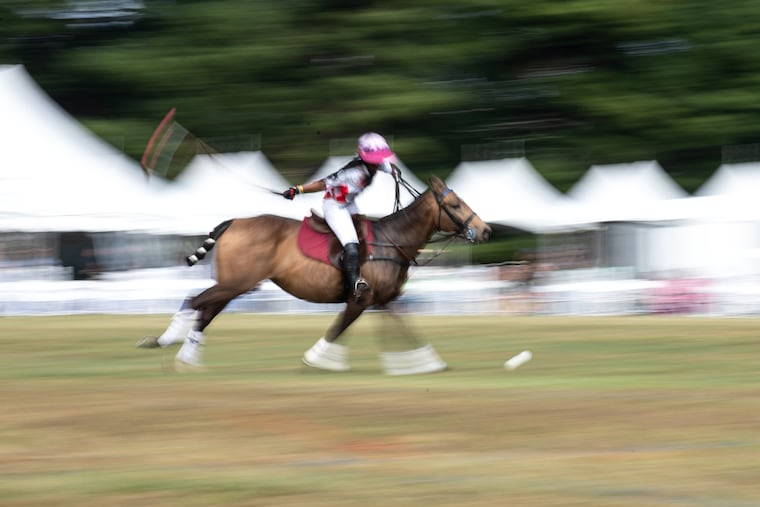Who needs Greenwich? The Philadelphia Polo Classic brings the ‘Game of Kings’ to Fairmount Park.
The third annual event was a fundraiser for Work to Ride.

Polo tends to be played on manicured lawns in Greenwich or Palm Beach or Santa Barbara, where Prince Harry, Duke of Sussex, might drop in. It’s sometimes called the game of kings.
It is less likely to be played on the scuffed-up fields of Fairmount Park, in the middle of Philadelphia. Yet that’s where hundreds of onlookers gathered on Saturday for the third annual Philadelphia Polo Classic, a fundraiser for the long-standing Work to Ride organization. The day featured two polo matches and a parade of foxhounds, among other attractions. To adapt to the unmanicured fields, the teams played with modified polo balls.
VIPs sat beneath white tents, wearing derby hats and fascinators, snacking on charcuterie and sipping champagne. For some, it was their first polo match ever.
“I was reading rules of the game on my way here,” said Lawrence Williams, a 67-year-old longshoreman who lives in South Philadelphia.
Founded in 1994, Work to Ride is the only program of its kind in the country, training kids from underresourced neighborhoods in Philadelphia to ride horses and play polo at no cost to their families. Over the years, its players have been featured in an international Ralph Lauren ad campaign and fueled an all-Black national championship polo team. Now the organization is fundraising $13 million to open a new indoor riding facility near the Chamounix Equestrian Center in Fairmount Park and upgrade its existing pastures. (It has already raised $11 million and has until December to raise the rest.)
“When we started launching this capital campaign, we talked about it, and we really wanted to do something big in Philadelphia,” said Work to Ride founder Lezlie Hiner. So the Philly Polo Classic was born.
On Saturday the mood at the polo fields was buoyant.
“You get to see everyone come together and just enjoy the outdoors and the sport,” said Brittany Ingram, as she and her family watched her daughter Jordyn Williams fly across the field.
Ingram signed Jordyn up for Work to Ride as a first grader; she liked that horsemanship defied “the usual expectations.” She watched as Jordyn matured and became an expert on horses. Now her younger daughter, Payton Williams, is also part of Work to Ride, planning to play polo in next year’s classic.
“I always saw my big sister playing,” said Payton, 11, as she watched her sister compete from a VIP tent to the side of the field. “I just joined to be with my sister, to annoy her. But then I ended up liking it, so I stayed.”
Payton said that in the past, kids at school laughed at her when they found out she rode horses; since then, she has mostly kept it to herself. Still, she aims to be a professional pony rider when she grows up.
On the field, the riders wore white pants — “whites” — and tall leather riding boots; the horses’ tails were braided and tied to prevent getting tangled up in the wooden mallets used to drive the ball.
“It can be scary from time to time, because certain horses are really tall, or really big and strong,” said Tajee McLaughlin, 15, a Work to Ride participant, after playing. “It’s all about confidence. The horse can sense your feelings as well as everyone else’s around them. So it’s better that you’re feeling good.”